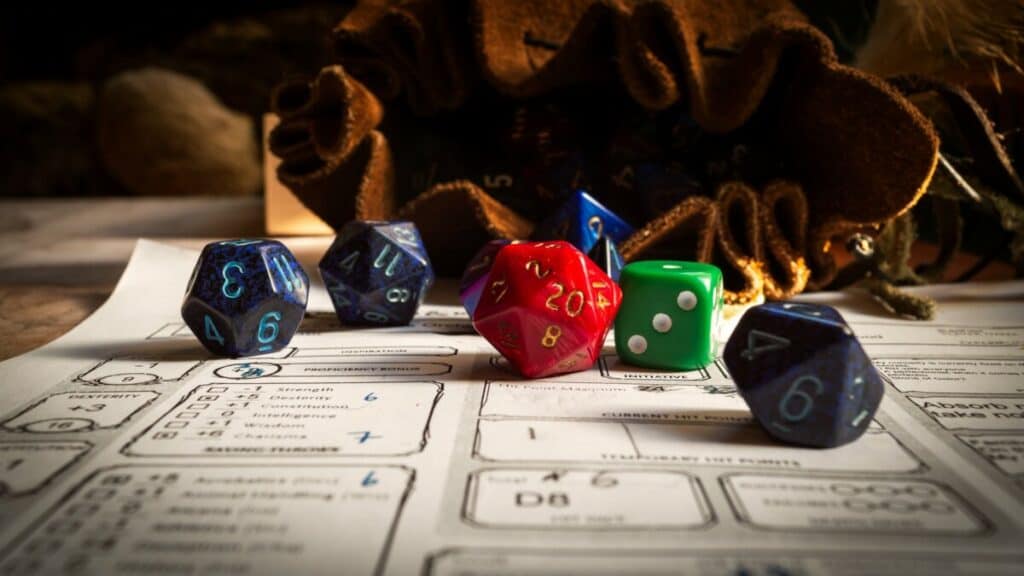When creating a fresh Dungeons & Dragons character, understanding which core stats to choose is arguably the most crucial part of the process! They determine your character’s potential and help to bring them to life so that you can play them exactly how you picture them. So what are the core stats in Dungeons & Dragons, and what do they mean?
The core stats for Dungeons & Dragons is Strength which measures physical force, Dexterity represents nimbleness, Constitution indicates your heartiness against disease & your max HP, Intelligence is your mental fortitude, Wisdom shows your understanding of your surroundings, and Charisma is your aptitude for social interactions.
Some stats are suited to specific classes, so we’ll take a deep dive into each core stat and look at which classes benefit most from them. We’ll also see how they affect the actions and proficiencies of your character and in which situations they will work best.

What Are The Core Stats Of Dungeons & Dragons?
Whether you relish the sheen of your well-polished great sword or prefer to draw from the deep well of magical energy within yourself, you’ll find the core stats of dungeons & dragons determines your success!
Strength, Dexterity, Constitution, Intelligence, Wisdom, and Charisma affect the damage, survivability, and overall success of every action you try to accomplish in the world of D&D. Characters rely on them when they roll their ability scores, their spell modifiers, and saving throws.
How Are The Core Stats Of Your Character Determined?
When you first play D&D, your DM (Dungeon Master) will have you create your character via a character sheet. You can use three methods to determine the starting core stats of your character.
- You roll a 3d6 die six times for every core stat and distribute the points according to the strengths and weaknesses of your character. Imagine you roll a 10, 11, 13, 15, 17, and 18. You might decide on 18 (STR), 17 (DEX), 15 (CON), 13 (CHAR), 11 (WIS), and 10 (INT) for your fighter. It is the standard method and is typically better for low-powered campaigns.
- Players may also roll a 4d6 die six times for each core stat while discarding the lowest score. You can then assign the numbers according to the stats of your preference. This method usually results in higher core stat numbers.
- Your DM will decide on a maximum number of points, and you can use them to buy core stats. They become more expensive the higher the stat but provide the player with more freedom. Imagine you have a total of 60 points to buy all your stats. Increasing your (CHAR) from 10 – 11 might cost you 2 points, but increasing it from 17 – 18 might cost 18 points.
Here’s a table illustrating the point-buying methods for deciding core stats:
| Ability Points (Core Stats) | Cost to Increase Stats |
|---|---|
| 8 | 0 |
| 9 | 1 |
| 10 | 2 |
| 11 | 3 |
| 12 | 4 |
| 13 | 5 |
| 14 | 6 |
| 15 | 8 |
| 16 | 10 |
| 17 | 13 |
| 18 | 18 |
The more points you have in a single core stat, the better the +bonus will be. If you have too few points, it can also incur a negative result, meaning you will need to minus the modifier every time you roll for a check related to that core stat.
Here’s a table showing the bonuses you receive according to your core stats.
| Current Core Stat | Bonus Modifier |
|---|---|
| 1 | -5 |
| 2-3 | -4 |
| 4-5 | -3 |
| 6-7 | -2 |
| 8-9 | -1 |
| 10-11 | 0 |
| 12-13 | +1 |
| 14-15 | +2 |
| 16-17 | +3 |
| 18-19 | +4 |
| 20-21 | +5 |
| 22-23 | +6 |
| 24-25 | +7 |
| 26-27 | +8 |
| 28-29 | +9 |
| 30 | +10 |
Proficiencies are innate skills or talents that your character can do well. Your core stats (STR), (DEX), (CON), (INT), (WIS), and (CHAR) gain bonuses from their +bonuses.
The proficiencies themselves also have +bonus, but they scale automatically according to your character’s level. This is assuming the use of experience points which generally isn’t closely followed at most tables, but generally estimated by most DMs. However, this can be used as a general guide for DMs/players or for tables that are very RAW focused, it gives you the numbers you need to know.
Here’s another table to demonstrate your proficiency bonus per character level.
| Experience To Level | Level | Proficiency Bonus |
|---|---|---|
| 0 | 1 | +2 |
| 300 | 2 | +2 |
| 900 | 3 | +2 |
| 2,700 | 4 | +2 |
| 6,500 | 5 | +3 |
| 14,000 | 6 | +3 |
| 23,000 | 7 | +3 |
| 34,000 | 8 | +3 |
| 48,000 | 9 | +4 |
| 64,000 | 10 | +4 |
| 85,000 | 11 | +4 |
| 100,000 | 12 | +4 |
| 120,000 | 13 | +5 |
| 140,000 | 14 | +5 |
| 165,000 | 15 | +5 |
| 195,000 | 16 | +5 |
| 225,000 | 17 | +6 |
| 265,000 | 18 | +6 |
| 305,000 | 19 | +6 |
| 355,000 | 20 | +6 |
These tables will be a great resource to help you understand the relationship between each core stat and proficiencies. When we delve into them in the following section, feel free to refer back here!
Strength (STR)
Strength determines your character’s ability to forcefully swing their weapon and interact with large, heavy objects. Characters with a lot of strength can easily lift heavy objects, break down doors, grapple, and shove, and they’re especially good at the athletics proficiency.
Strength will appeal to players who enjoy the thrill of frontline combat or who enjoy being able to leap to an ally’s aid. Some players love the brutality and salivate at the thought of getting bloody and dirty from a well-fought battle! Strength is a helpful core stat for barbarians, fighters, and monks.
Barbarians, fighters, and monks need strength because it helps them to do more physical damage during combat. The great axe of a barbarian, a fighter’s longsword, and a monk’s short sword rely on the strength stat to do damage. They also use Strength for strength checks and strength saving throws.
High Strength Makes You Better At Strength Proficiencies
The strength stat makes your character better at the athletics proficiency. While your character can be adept in several proficiencies, athletics is the only one that relies on strength. It determines your character’s ability to swim, jump, or climb.
Athletics help your character maintain their grip while climbing a slippery, snowy cliff or allow them to avoid a large boulder that comes crashing down while they climb.
If you fall into a raging current, and a strange tentacle pulls you down with a mighty grip, a high strength number will help you break free, and your athletics proficiency will allow you to swim to safety.
Consider you have 18 strengths and 2 athletics. When you roll athletics, you’ll add +4 because you have 18 strength and +2 because you are proficient in athletics.
If you need to roll 15 athletics to swim against a strong current and roll a 10, you add +4 (STR) and +2 (athletics proficiency) for a total of 16, so your roll would be a success!
Strength Checks & Saving Throws
Strength helps you accomplish feats of strength that require your character to exert physical force. These actions involve strength checks and strength saving throws.
Strength checks are necessary when you attempt to use brute force to accomplish a task. High strength will allow you to force open chests or lockboxes instead of lockpicking them or hanging onto the getaway wagon of the notorious thief you’ve been hunting for weeks.
Strength saving throws are rolls that your character must make to save themselves from the impending disaster that is about to befall them.
Imagine you and your party decide to explore the ancient tomb of a lich, and while delving deeper, your party is caught off guard by a massive boulder rolling toward you. You can catch and deflect the boulder away from your party with high strength to save them.
You’ll make a strength check to see if you catch the boulder, then a strength saving throw to see if your character can throw the boulder without causing harm to themselves. Failing these throws may result in you and your party getting crushed or your character breaking their fingers!
If your character gets caught in a net, you can roll a strength saving throw to see whether your character can break the net with brute force.
Note that the action of dodging the net before it catches you requires a Dexterity saving throw, not Strength. If your strength is too low, you can have someone with high strength in your party try to break you free.
Automatic strength saves are not overly important to remember, but it’s good to be aware of them. When your character travels through a low-level area or faces low-level creatures, your DM may decide that you’re circumstances pose no threat and thus automatically pass any strength checks.
These challenges generally require a DC 15 to overcome, but if they did only one or two damage, it wouldn’t be worth the time, effort, and engagement.

Dexterity (DEX)
Dexterity affects your character’s nimbleness, reflexes, and sense of balance and makes them proficient at using dexterous weapons like daggers and longbows. Characters with a lot of dexterity can move quickly and quietly and more easily maneuver a slippery floor. They are good at the stealth, acrobatics, and sleight of hand proficiencies and can go earlier in the combat turn order.
Dexterity is a great choice for players who prefer to solve their problems indirectly with cunning, guile, and a silver tongue. They avoid face-to-face confrontation whenever possible, preferring to use the tools of information and persuasive agreements to achieve their goals. Dexterity is a helpful core stat for Rangers, Rogues, Bards, Fighters, and Monks.
Ranger, Rogue, and monk weapons use the Dexterity stat to do damage. Bards are more flexible in that some people create bards that focus on either Strength or Dexterity. While fighters use Strength for their weapon damage, they need Dexterity to boost their AC (armor class). All these classes use Dexterity when they roll for dexterity saving throws.
AC (Armor Class) is the number that determines the chance that the enemy has to hit you. If your AC is 16 and the creature rolls a 16 or higher on hit, it hits you and can then roll again to see how much damage they do to you. If the creature rolls a 15 or lower, they miss, don’t get to roll for damage, and you take no damage.
A Fighter with low Dexterity will have dangerously low AC and have difficulty standing toe-to-toe on the front lines. It is also why caster classes like wizards want to stay behind their allies; their dexterity is low, so they will have low AC, meaning the enemy can more easily hit them.
High Dexterity Makes You Better At Dexterity Proficiencies
Dexterity has a profound impact on the nimbleness of your character and, as such, affects your stealth, acrobatics, and sleight of hand proficiencies.
Stealth checks rely on dexterity and allow you to enter stealth to approach a potentially dangerous event with caution. It is also possible to make a stealth check if you believe there might be invisible enemies and you wish to detect them.
Acrobatics checks help your character to stay on their feet without getting knocked down from a sudden blast of air, and it can help to maintain your balance if you need to cross an icy surface.
Sleight of Hand will rely on your Dexterity to lift a coin purse from a wealthy nobleman, plant incriminating evidence on the captain of the guard, or conceal an object.
Dexterity Checks, Saving Throws, And Initiative
You’ll need to roll Dexterity checks and saving throws if you want to get out of the way of a potentially fatal object or event.
If one of your party members springs a trap that rains arrows down on the party, you can roll a Dexterity saving throw to see if your character is quick enough to avoid the arrows. Remember, when you roll to prevent harm to your character, you always roll a saving throw.
Imagine that you and your party trek through a murky swamp only to be ambushed by bandits. They immediately attempt to throw a net over you to ensnare and immobilize you.
While the net is on its way to your character, the DM may ask that you roll a Dexterity check to see if your character can evade the incoming net. If they capture you successfully, take you to their hideout, and tie you up, you might roll a Dexterity saving throw to try and wriggle free from the ropes around your hands and feet.
Dexterity is the universal stat among all classes that affect when it’s your turn to go into battle, and it’s called Initiative.

Constitution (CON)
Constitution is essential for all classes and measures your character’s ability to receive damage and surpass events that would otherwise kill them. It gives your character Health Points (HP) and allows them to accomplish feats like holding their breath longer, resisting certain spells, going for long hours without rest, and surviving without food and water.
Constitution is essential for every class because damage often comes unexpectedly in the world of D&D. Melee classes typically have a higher constitution because they are more likely to be in the line of sight of the enemy and, thus, more susceptible to damage.
If your party gets trapped in a small space, however, you may not be able to rely on a front liner to soak up the damage. There’ also the fact that failing a Constitution save tends to be, well, nasty.
How Does Constitution Work?
Imagine you’re a level 5 fighter with 60 HP and 18 AC. Your party gets ambushed by a group of goblins on your way to town, and one of the goblins decides to take a swing at you with their scimitar.
The gutsy goblin rolls a 19 on hit and gets ready to take a hefty swing at you. If he rolls a 1d6+2 and a 4+2, you’ll take 6 points of damage, and your HP will drop from 60 to 54.
You Might Also Need To Make Constitution Saving Throws
If an enemy attempts to cast mind control or charm, you can roll a Constitution saving throw to resist the spell’s effects.
In some cases – like with the spell Fireball, you can only resist half the damage rather than the entire spell. Casters also need to make constitution saving throws when enemies attack them while casting a spell. If they fail, the enemy will stop their cast.

Intelligence (INT)
Intelligence affects your character’s mental capacity and ability to reason. Characters with high Intelligence tend to be scholars with in-depth knowledge of abstract subjects like ancient cultures. They can also execute intellectual tasks like forging a document. They specialize in the Arcana, History, Investigation, Nature, and Religion proficiencies.
Intelligence is a vital core stat for Wizards and helpful for Druids. The spells that wizards cast rely on Intelligence to deal damage. While druids use Wisdom for their spells, they also use Intelligence for saving throws, alongside Wizards.
High Intelligence Improves Proficiencies
Arcana is an intelligence-based proficiency that allows your character to recognize the nature of magical items, spell lore, and makes your character knowledgeable on magical traditions. It can also help you to identify the properties of an unidentified magic item, like a ring, amulet, or piece of equipment.
History is the proficiency that demonstrates your character’s knowledge about the historical events of the DnD universe. You’ll know about past events, local myths and legends, and lost civilizations.
Investigation helps your character look for anything within a space that may explain the events that transpired. You can find the location of an object among ruins, deduce the cause of death on a corpse, or discover the secrets of an ancient manuscript.
Nature is an Intelligence roll that gives your character the ability to identify the landscape, type of terrain, vegetation, wildlife, and weather patterns. It can help find specific healing herbs or lay a successful ambush according to the landscape.
Intelligence Checks & Saving Throws
Intelligence is great when no one in your party has animal handling, and you want to communicate with an animal. It can help you decipher what an animal wants to convey without using words by observing body language. If you want to know an animal’s intentions, your DM may ask you to roll an Intelligence check to see if you can understand the animal or creature.
Imagine you find yourself investigating a corrupt innkeeper who only meets their associates via a signed letter. Using an Intelligence check, you can forge the signature on a makeshift note and infiltrate their operation by going undercover.
Intelligence saving throws are as rare as wyvern’s teeth when you compare them to saving throws for the other core stats. They are primarily for spells that affect your character’s mind, like illusions. Here’s a comprehensive list of spells that will require Intelligence saving throws. The most infamous creatures with powerful mind attacks are mind flayers.

Wisdom (WIS)
Wisdom represents your character’s understanding and intuition of the world around them. Characters with high Wisdom are more sensitive to the behaviors of people, animals, and places around them. These characters are adept at the Animal Handling, Insight, Medicine, Perception, and Survival proficiencies.
Wisdom is an important stat for Clerics, Druids, Paladins, Warlocks, and Wizards. All of these classes, except Wizard, use it as their primary stat when casting spells and healing. Wizards use Intelligence, but they also use Wisdom for saving throws.
Wisdom Will Affect Your Proficiencies
Animal handling has your character use their wisdom to discern the intentions of animals and to understand the reasons for their behavior. You can calm or prevent a frightened animal from fleeing or getting spooked. It is also possible to persuade an animal to do something or go somewhere.
Insight helps your character understand their interactions with others, often allowing them to discern the true intentions behind someone’s words or actions. You can tell whether someone is truthful by observing their body language and habits. It’s an excellent proficiency to have when you interrogate someone or if you believe your quest giver is not being entirely truthful about the quest details.
Medicine gives your character expertise in medicine and illnesses or diseases. You can identify the nature of a disease, and your medical knowledge will help you stabilize someone on the brink of death. You can also treat these illnesses and diseases and know the extent of a wound and whether it results from a rapier or poisoned arrow.
Perception refers to your character’s ability to use their senses to identify things through hearing, sense, touch, smell, and sight. Characters with high perception are more aware of what’s around them and can even detect enemies in stealth.
Survival represents your character’s ability to track footprints in the dirt, hunt for food, and traverse harsh landscapes. You’ll be able to gain insight into the kind of creatures that inhabit certain areas, avoid quicksand when exploring dangerous tombs, and notice hazardous events related to the environment.
Wisdom Checks & Saving Throws
If you find yourself fighting an enemy that appears dead, you can make a Wisdom check to discern whether the creature is undead. It will benefit you to know your enemy and may even provide insight into the surrounding environment.
When your character faces the dilemma of choosing between two paths, they can roll a wisdom check to ascertain more about each path and select the one that seems more sensible. Do you take the short path with ominous clouds or the winding path that looks like an ancient battlefield?
Wisdom saving throws are necessary for some spells, like Charm Person, Hideous Laughter, and Imprisonment. These spells incapacitate your character, while Charm Person will have them fighting for the opposition. If you fail your Wisdom saving throw, your character will need to roll again at the start of their next turn until they succeed and break free from the control of the enemy.

Charisma (CHA)
Charisma affects your character’s interactions with other people and makes it easier to persuade or manipulate others and get them to do what you need. Characters with high Charisma are leaders, great negotiators, and appear charming in the eyes of others. These characters are adept at the Deception, Intimidation, Performance, and Persuasion proficiencies.
Charisma is an important stat for Bards, Clerics, Paladins, Sorcerers, and Warlocks. It’s the primary stat for Bards, Sorcerers, Paladins, and Warlocks who use it to cast spells, inspire allies, put on performances, and persuade others. While it’s not Clerics’ primary stat, they use it for saving throws.
Deception allows your character to bluff and deceives others with speech or action – such as maintaining a straight face while lying about your identity to navigate freely behind enemy lines. You could want to swindle a merchant or give someone misinformation to lure them out of town to interrogate them.
Intimidation allows your character to influence someone’s decision through hostility and physical violence. While it may affect your reputation with villagers if you went around scaring the merchants or townsfolk, bandits, goblins, and other evil characters itching for a fight are fair game.
Imagine walking through the slums of a beatdown city, only to be approached by a group of knife-wielding thieves demanding all your valuables. You can roll an Intimidation, stating, “You want my valuables? How about my greataxe instead? The ol’ girl is thirsty for some blood.” If you succeed in your roll, they may think twice about whether it’s worth risking their lives for your valuables.
Performance influences how well you can sing, dance, and play a musical instrument to please an audience. Your travels may have you telling stories in the local tavern or playing your lute to make gold for your next piece of equipment. Your Performance ability could also help you get close to a king by posing as the court jester to discover their assassin.
Persuasion measures your skill with words and how to use them to get others to change their initial decision. If your quest giver offers you 60 gold pieces as a reward for the quest, you could use persuasion to convince them the job is pretty dangerous, and 80 gold would be a fair price for your services.
When you act in good faith with others during a dialogue – like convincing them through a mutual agreement – you get unique opportunities to build relationships through your interactions. It could be that your party needs to warn the king of an impending bandit attack on the city, and you need to persuade the guardsmen to let you pass.
Charisma checks will come up when you visit the tavern and scan the room for the person most likely to have the scoop on the latest rumors.

DnD Core Stats: In Conclusion
Now that you leveled up from getting this far and understanding every core stat, which proficiencies they affect, and when they become essential, you’re ready to create your perfect character!
Consider what you want your character to do if you’re unsure which stats to choose. Start with the proficiencies and work backward to the core stats. Whether you prefer to call them core stats or ability scores, it doesn’t change the fact that these are the backbone of building your next successful D&D build!
Other DnD Articles You May Enjoy
- How Does Passive Perception Work?
- How Does DC Work in D&D?
- How Does Disarm Work in D&D?
- DnD Lawful Good Alignment Guide
- DnD Lawful Neutral Alignment Guide
- One DnD Level 4 Feats
- One DnD Epic Boons Guide

Proud to embrace the locally created moniker of “Corrupt Overlord” from one of the all time great Lords of Waterdeep runs, Shane is one member of the Assorted Meeples crew and will be hard at work creating awesome content for the website. He is a long-time player of board games, one time semi-professional poker player, and tends to run to the quirky or RPG side of things when it comes to playing video games. He loves tabletop roleplaying systems like Dungeons & Dragons, Pathfinder, Werewolf, Fate, and others, and not only has been a player but has run games as DM for years. You can find his other work in publications like Level Skip or Hobby Lark.
